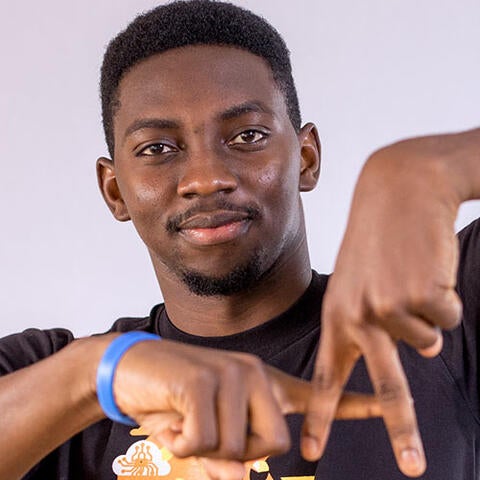
Building a generation of tech leaders in Africa
Startup that was co-founded by three Waterloo alumni scouts brilliant people across Africa and creates an environment for them to thrive

Startup that was co-founded by three Waterloo alumni scouts brilliant people across Africa and creates an environment for them to thrive
By Kira Vermond University Communications
Nadayar Enegesi (BCS '13)
Alumnus, Faculty of Mathematics
> Co-Founder, Andela
With an acceptance rate of only 0.8 per cent, CNN has called African IT company Andela, one of the most selective programs in the world and “…harder to get into than Harvard.”
Andela is, after all, a company that takes the brightest and most brilliant math, tech and engineering minds on the continent, and then trains them to become accomplished, top-tier developers. Eventually, the developers, known as “fellows,” go on to take full-time roles in international firms such as Google and Facebook.
But the company’s extreme recruiting isn’t about elitism insists co-founder Nadayar Enegesi, a Waterloo computer science alumnus. In fact, it’s about breaking down barriers – and lifting up the hundreds of programmers it has trained since the company launched in 2014.
“There is brilliance literally everywhere on the planet,” Enegesi says. “What Andela is essentially doing is scouting really brilliant people who have some sort of disposition toward technology, and creating an environment to thrive, learn and grow quickly.”
Enegesi helped found Andela with two other Waterloo alumni: Brice Nkengsa, a software engineering grad, and Iyinowlua “E” Aboyeji, a Waterloo arts grad. The three Waterloo entrepreneurs never thought they’d actually move back to Africa after living in Canada. But after networking pro Aboyeji reached out to entrepreneur superstar Jeremy Johnson in New York City, their future changed.

Soon Enegesi had a one-way ticket to Lagos from Toronto, ready to recruit and train the first set of Andela developers. Within days of seeing Enegesi hop the plane for Africa, Nkengsa dropped everything in Toronto and moved to NYC, where Andela is incorporated, for eight months before heading to Lagos too.
“At the time, I wasn’t thinking about coming back to Africa at all, but there was an electric connection and this desire to make an impact,” says Nkengsa.
It was a decision that paid off. Today Andela is in five locations with offices in New York, San Francisco, Lagos and Kampala in Uganda. And it still plans to grow. There are 600 developers and more than 100 partner companies spread across about 55 cities.
In fact, Africa is home to seven of the top 10 fastest growing Internet populations in the world so it’s easy to see why corporations like IBM, Microsoft and Viacom are working with Andela programmers and why the company has been able to raise $80 million in funding.
“You probably wouldn’t have thought in the next million years that the tech leaders building your products will come from Africa,” says Enegesi. “But now we’re showing the world that that’s possible.”

Read more
The world is at a historic crossroads with the largest generation of young people coming into the workforce at the same time as the fourth industrial revolution.

Read more
A Waterloo economist says university-educated immigrants in the U.S. earn more than comparable U.S.-born workers, while in Canada the situation is flipped

Read more
Waterloo English professor wins prestigious Polanyi Prize to continue to examine the shared connections among Vietnamese, Syrian and Mennonite refugees
The University of Waterloo acknowledges that much of our work takes place on the traditional territory of the Neutral, Anishinaabeg, and Haudenosaunee peoples. Our main campus is situated on the Haldimand Tract, the land granted to the Six Nations that includes six miles on each side of the Grand River. Our active work toward reconciliation takes place across our campuses through research, learning, teaching, and community building, and is co-ordinated within the Office of Indigenous Relations.